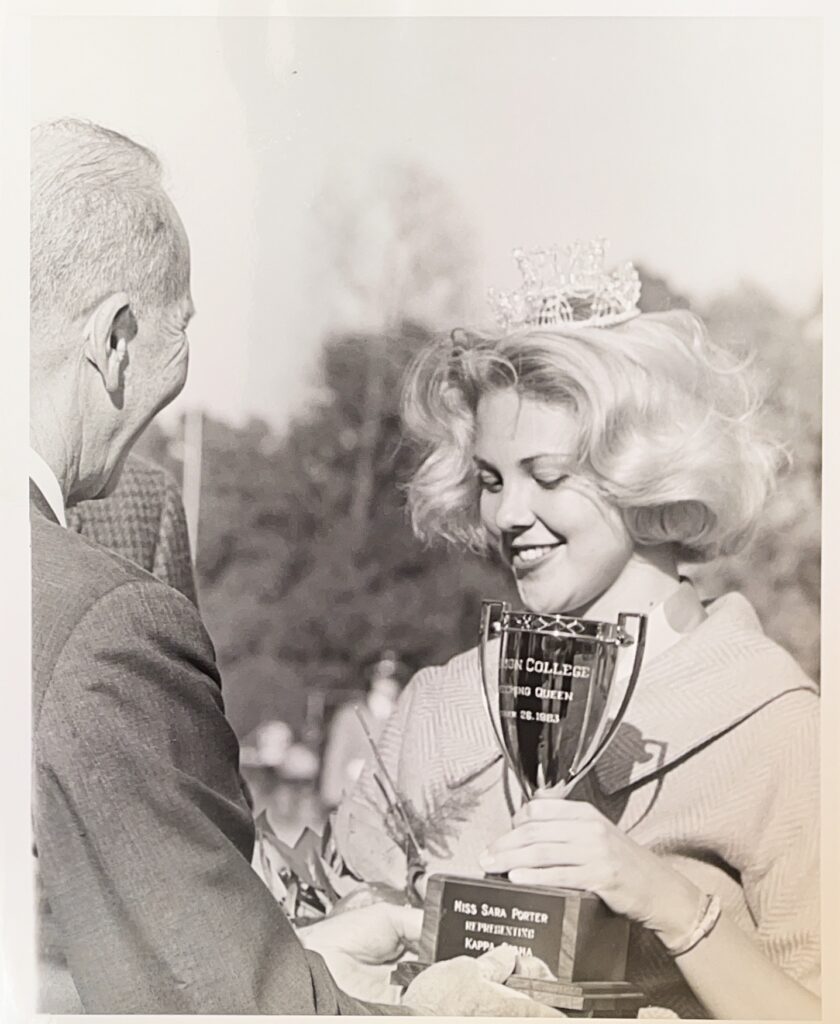By Ellen Huggins, JEC Archives Fellow
Post 1: Introduction

In the spirit of the “Fun and Frolics” theme of this year’s Archives Month, I’ve been rifling through our folders of archival photographs from college events (Freshman Orientation, Cake Races, Spring Flings….) to get a sense of what fun has looked like over the years on Davidson campus. The 50th anniversary of coeducation this year has also been sticking in the back of my mind, particularly the question of how women show up in the Davidson Archives before they were officially full time, degree earning students. Surprisingly, one of best places to find pictures of young women pre-1972 in the archives is the “Homecoming Queen” folder, which dates all the way back to 1959. It would be easy to view the title as a relic from a time when women were considered guests at Davidson, but as I dug deeper into the folder, I found it even more intriguing that the Homecoming Queen continued to be crowned far past the beginning of coeducation, and into the present day.
In 2022 the College’s tradition of crowning a Queen during the Homecoming weekend football game might be all but forgotten, but it remains unexplored as one the longest running institutions for women on the Davidson campus. What can the history of Homecoming Queens tell us about the evolution of women’s roles at Davidson College from before coeducation to the present? I’ll be attempting to answer this question in this series of blog posts, so follow me through the archives as we explore fun, frolics, and Homecoming Queens at Davidson!

But first, what is Homecoming?
Every school has a different definition of what Homecoming means and how their traditions inform that meaning, but essentially, Homecoming is a weekend early in the school year where the college welcomes both current students and alumni to campus, hosts a football game, and traditionally, a dance. Homecoming weekend exists at the intersection of multiple interests; alumni who want to have a nostalgic time on campus, faculty who wants to show off their campus to those alumni (and maybe get appreciation in the form of money) and students who just want to have a carefree weekend. By extension, the Homecoming Queen represents an equally wide array of parties on campus; unlike a student dance like Prom where the title would be announced and given solely in front of their peers, the Homecoming Queen ceremony takes place on the football field in front of faculty, parents, alumni and students alike.

So, who (or what) does the Homecoming Queen represent?
For more than a decade before women could be degree earning students on the Davidson campus, the original Homecoming Queen candidates were female students from different colleges in the area. Initially, it confused me to see how far back in time the Homecoming queen folder extended. I had always assumed a school’s Homecoming Queen was elected based on their great grades, their involvement on campus (and yes, more often than not they just so happen to be conventionally attractive as well); that they represent, at least subjectively, the best that the student body had to offer. But this is a fairly modern interpretation of what the Homecoming Queen competition was originally conceived to be. At least at Davidson, Homecoming Queens were initially crowned not as student representatives, but as feminine figure heads of the wholesome, nostalgic heart of Homecoming itself. In the next blog post, we’ll discuss more about how women were tied into the “wholesomeness” of Davidson Homecoming celebrations starting with the introduction of the Homecoming Queen competition in the midcentury, and what this reveals about the connection between fun, frolics and understandings of gender at Davidson.
Thank you for tuning in, and come back soon for Part 2!
Works Cited: https://davidsonarchivesandspecialcollections.org/archives/encyclopedia/homecoming-results







